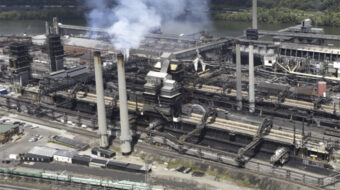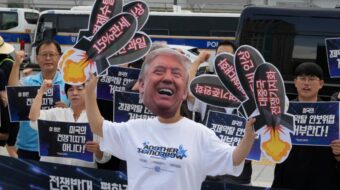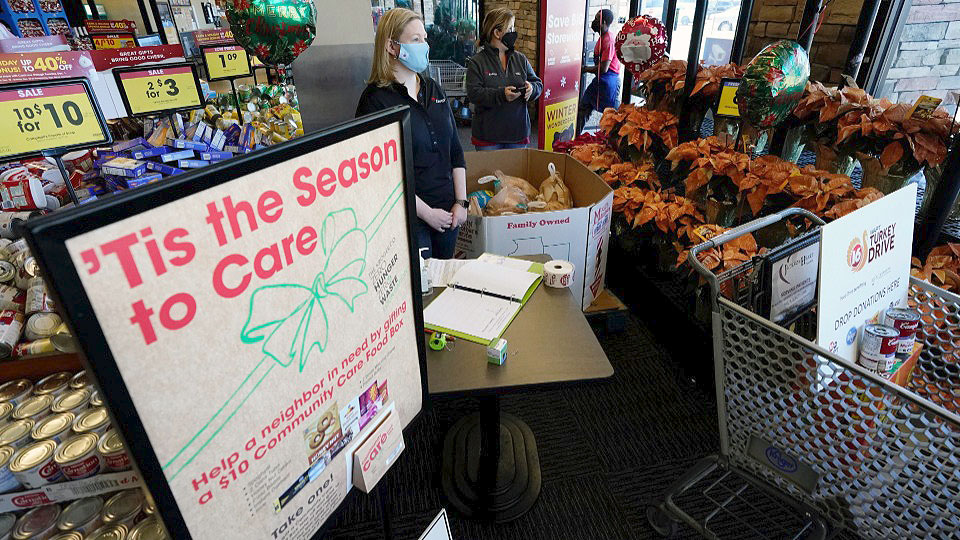
WASHINGTON—Three front-line workers whose lives and livelihoods are under constant pressure from the threat of the coronavirus pandemic say their employers—a grocery chain and an acute-care facility—first hailed them as “essential” and treated them well. But after an initial burst of recognition, the companies are now more interested in profits than in people.
But in a Zoom discussion convened by the Brookings Institution think-tank, workers Lisa Harris, Jeffrey Reid, and Sabrina Kopps all also agreed that without protection from their unions, the situation would be much worse.
Harris, a cashier for Kroger in Richmond, Va., and Reid, a meat department clerk for a Giant food store in D.C.’s Maryland suburbs, are members of the United Food and Commercial Workers. Kopps, a Service Employees member, was a housekeeping aide at a D.C. acute-care facility who recently was promoted to be a housekeeping supervisor.
All three are also members of a Brookings advisory panel of rank-and-file workers nationwide and contributors to the institution’s report, released Nov. 20, on how major retailers are treating, or mistreating, frontline “essential” workers during the coronavirus pandemic.
The report says most major retailers, including two of the largest, notoriously anti-worker Walmart and anti-union Amazon, first declared “essential” workers vital and gave them bonuses and hazardous duty pay, but later halted it, even though the viral threat has increased. A few retailers have continued the pay, and one non-union firm raised the pay of all its workers to $15 an hour, voluntarily.
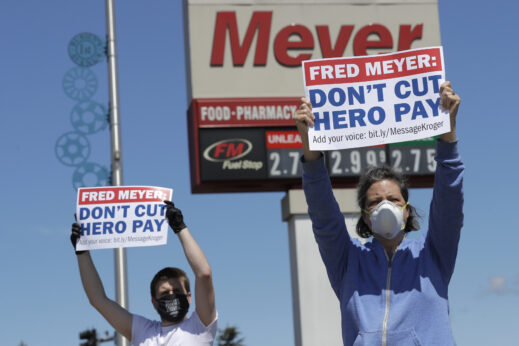
The pandemic is a particular threat to grocery workers such as Harris and Reid and health care workers such as Kopps, all of whom have constant interactions with the public and thus increased exposure to the virus. Some 12.6 million people have tested positive for coronavirus in the United States since the viral pandemic began. And 259,845 have died.
All three workers on the panel are Black. Studies show people of color, but particularly Black Americans, work in occupations and/or have pre-existing conditions which sharply increase their COVID-19 exposure and death rates.
“Kroger used to use the phrase ‘We’re all family,’” when the pandemic began, Harris told a Nov. 23 Zoom press session which also included strongly pro-worker Sen. Sherrod Brown, D-Ohio, and Service Employees President Mary Kay Henry.
“Now it’s like we’re the part of the family you don’t invite.
“Just dealing with patients is time-consuming and scary,” added Kopps, the health care worker. “It’s petrifying not knowing if they have COVID…I’m scared because I can bring COVID home to my daughter, my son, and my grandson.” And both Kopps and her son are asthmatic, putting them at higher risk.
It’s also emotionally draining, she noted, since the viral pandemic, which has been particularly dangerous in acute-care and other nursing home-like facilities, forced managers to literally bar all family contact with residents.
That meant, Kopps said, that often the residents’ sole human contact—including caring and compassion for those dying from the virus—comes from the essential workers, including housekeepers such as her.
“We have personal protective equipment (PPE), we have N95 [anti-viral] masks, we have gowns, we have gloves, we have booties. And protective face shields are now a must,” she added. That’s unlike many other facilities, where registered nurses and other health care workers have raised the roof, for months, about lack of PPE, especially masks.
“But they, the patients, need companionship, too. I see a lot of patients deteriorate and expire over time,” because they lack human contact, except for staffers.
Reid added workers had another fear, and still do: Not only did management keep them in the dark, but so did “the current administration,” meaning the GOP Trump regime. It denied the threat of the virus. “You couldn’t get a straight answer. The president was saying ‘It’ll be OK,’ and then you see these numbers” of the ill and the dead, Reid commented.
What Reid called “pandemonic shopping” in the early days of the virus’s spread only made things worse. He described getting to his Giant store at the start of his 6 am shift to find people lined up already, in darkness, waiting for it to open so they could enter and sweep the shelves clean of basics such as paper towels, toilet paper, and disinfectant.
And since the essential workers, many of them longtime employees like himself, had gotten to know individual shoppers personally, it was difficult to tell them “our supply chains are strained and we couldn’t keep up.” Luckily, he said, his store had enough PPE for everyone, because the Montgomery County, Md., government acted fast to buy loads of needed supplies, especially masks, and distribute them.
“But social distancing still wasn’t happening in every store in the beginning, and you could see the fear in people’s faces,” Reid mused.
Meanwhile, the huge jumps in sales meant “the bosses were making billions and billions in profit.” Rather than using it to raise workers’ pay, or retain the hazard pay, they pocketed it, or used it for stock buybacks, he noted. “To me, it’s just plain greed,” said Reid.
The three had suggestions for solving the troubles and terrors essential workers face.
“This is a public health emergency. The coronavirus doesn’t care if you’re rich or poor or red or blue,” said Reid.
So he wants the incoming Democratic Biden administration to both “institute a policy so this” danger “doesn’t happen again and to enact moves—such as raising the federal minimum wage to $15 an hour and getting firms to restore the hazardous duty pay—that would help beleaguered workers financially.
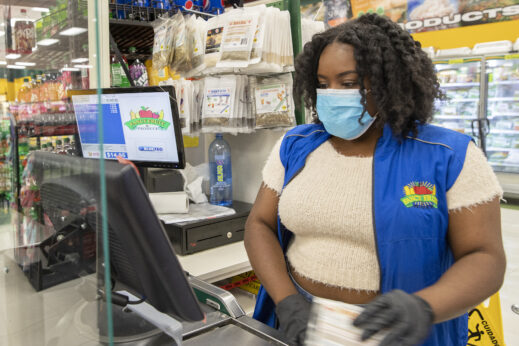
“Get them (companies) to take care of their workers,” he declared.
You also must enforce universal protective measures, such as mask-wearing and social distancing, Harris added. No exceptions. “You can’t play Russian roulette with people’s lives.”
The workers’ stories drew support and pledges from Henry and Brown.
“They’re feeling sacrificial and it breaks my heart,” the SEIU president said. “It also makes my blood boil.”
But remembering the disproportionate danger to workers of color and their families, Henry added the pandemic also presents lawmakers and the incoming Biden administration with “a huge opportunity” to help close both racial and economic inequality, by practical moves.
One would be to ensure enough PPE—something Biden has promised to do by invoking the Defense Production Act to force domestic manufacture of more masks, gloves, and other gear—and passing legislation to both raise the federal minimum wage and to strengthen the right to unionize.
In a Zoom meeting the weekend before between the president-elect and several union presidents, including herself, “Joe Biden told me it’s time we stop beating pots and pans” in appreciation of nurses, health care workers, and other essential employees “and started investing in them.”
“Our economy is supposed to reward those [workers] whose talents are in high demand,” the strongly pro-worker Ohio senator added. “That’s what capitalism is supposed to be about. But they”—the corporations and firms—“don’t.”
“I’ve been calling for these changes for months. But Mitch McConnell,” the GOP Senate Majority Leader “and Donald Trump have blocked them so far. Eighty million votes”—Biden’s popular vote total in his 2020 election win against Trump—“sent a message that we’ve had enough of Wall Street running our economy.”
“There’s a lot that Biden can do,” Brown commented. “And we’ll dare Mitch McConnell to stand in the way.”



